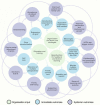Grief, Stress, Trauma, and Support During the Organ Donation Process
- PMID: 32047840
- PMCID: PMC6964929
- DOI: 10.1097/TXD.0000000000000957
Grief, Stress, Trauma, and Support During the Organ Donation Process
Abstract
The organ donation process is complex and stressful for the family of the potential donor and members of the multidisciplinary team who may experience grief, ethical dilemmas, vicarious trauma, or compassion fatigue. Several studies each explore the role of a specific healthcare group and the impact of inhospital processes on group members. We conducted a systematic literature search to identify such studies and a qualitative synthesis to consolidate findings and highlight features of the interaction and relationships between role players. Our results suggest that, while healthcare professionals have different roles, attitudes, and views, the experience of stressors and interdisciplinary tension is common. Nevertheless, staff are united by the goal of caring for the patient and family. We therefore propose that, while focusing on bereavement care and other aspects of the family's experience, staff can find other shared goals and develop understanding, trust, empathy, and respect for each other's positions, thereby improving functioning in the complex adaptive system that forms at this time. Education and training can equip staff to facilitate anticipatory mourning, family-led activities, and a meaningful parting from their relative, assisting families with their grief and increasing staff members' efficacy, confidence, and interdisciplinary teamwork. Knowledge of systems thinking and opportunities to share ideas and experiences will enable staff to appreciate each other's roles, while supportive mentors, self-care strategies, and meaningful feedback between role players will foster healthy adjustment and shared learning. A focus on psychosocial outcomes such as family satisfaction with the process, collaboration within the multidisciplinary team, and reduction in the role stress of healthcare professionals will contribute to family well-being as well as personal and professional growth for staff.
Copyright © 2019 The Author(s). Transplantation Direct. Published by Wolters Kluwer Health, Inc.
Conflict of interest statement
The authors declare no conflicts of interest.
Figures
References
-
- Jacoby LH, Breitkopf CR, Pease EA. A qualitative examination of the needs of families faced with the option of organ donation. Dimens Crit Care Nurs. 2005; 24(4):183–189 - PubMed
-
- Lloyd-Williams M, Morton J, Peters S. The end-of-life care experiences of relatives of brain dead intensive care patients. J Pain Symptom Manage. 2009; 37(4):659–664 - PubMed
-
- Manuel A, Solberg S, MacDonald S. Organ donation experiences of family members. Nephrol Nurs J. 2010; 37(3):229–236. quiz 237 - PubMed
-
- Dodd-McCue D. Siegel J, Alvaro E. Behavioral research in hospital settings: the family communication coordinator (FCC) protocol and research applications in organ donation. Understanding Organ Donation: Applied Behavioral Science Perspectives. 2010. Chichester, UK: John Wiley & Sons; 149–163
-
- Smith Z, Leslie G, Wynaden D. Coping and caring: support resources integral to perioperative nurses during the process of organ procurement surgery. J Clin Nurs. 2017; 26(21–22):3305–3317 - PubMed
LinkOut - more resources
Full Text Sources


